Learning how to write an ‘About Me’ page on your website is essential for establishing yourself as an authority figure while also creating a connection with your audience. It can end up being one of the most visited pages on your website!
You want to present yourself in the best light possible and make sure prospective customers or clients know who you are, why they should trust you, and how you can help them.
But with so many different elements to consider—from writing style to visuals—it can be hard to know where to start.
It can be tricky to get it right and make sure that your About Me page stands out from the rest.
That’s why we have put together this blog post on how to write an ‘About Me’ page that will help you introduce yourself, showcase your work, and build trust with potential customers or readers.
In this blog post, we will be discussing 8 cardinal rules that you can use as a step-by-step guide to create an amazing ‘About Me’ page on your own site.
We will also provide some examples of great about me pages to help inspire you in crafting yours.
So if you’re looking to make a lasting impression, look no further!
What is an ‘About Me’ Page?
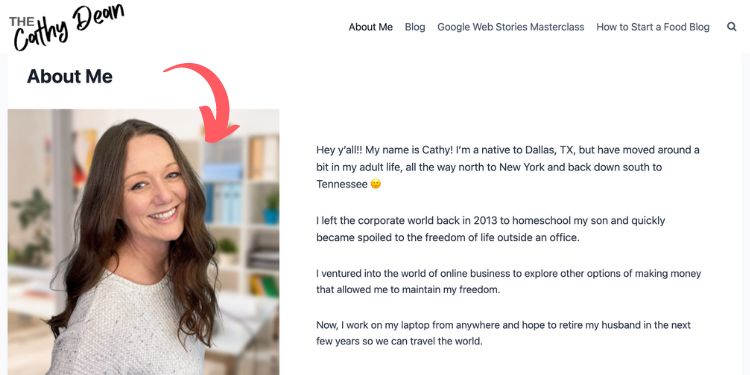
An About Me page is a page on your website that provides visitors with an insight into the person or business behind the website.
It typically includes information such as founder information, background about the founder or how the company was founded, a summary of accomplishments and/or qualifications, and more. It also often contains a mission statement, if you have one, and client testimonials, when applicable.
An effective About Me page should be well-written and visually appealing, using simple language to explain who you are, what you do, and why you do it.
It should contain content that conveys your experience in the relevant field but also present your passion for what you do in a professional way without being overly promotional or gimmicky.
Why an ‘About Me Page’ is Important
An ‘About Me’ page serves a few important purposes on your website.
Trust and Confidence
First, it gives visitors a way to learn more about you and/or your business in a concise and more personal way.
Having an About Me page on your website builds trust with potential customers and gives them more confidence in you and your business.
By sharing things like your background, experience, credentials, accomplishments, and testimonials, you will become a more credible source of knowledge for your audience.
Additionally, telling personal stories and experiences can help to convey reliability and create deeper connections with your audience.
Search Engine Optimization (SEO)
Secondly, having an ‘About Me’ page also helps with search engine optimization (SEO).
A well-written and detailed About page full of that credibility we just discussed will help you to become an authority figure in your niche. Google wants to see that you are producing informative, valuable, and credible information about certain topics and an About Me page is a great place to back up your content.
Additionally, providing links to other relevant pages on the website will increase the reach of those pages as they become more easily discoverable by search engines.
Services and Sales
Including examples of past work, portfolio items, positive feedback, or client testimonials can be a great way to showcase what you do and how well you do it. This allows visitors to see what kind of services you offer, what you have achieved in the past, and whether or not they can trust you.
This comes full circle back to what we said earlier about trust and confidence. These are huge factors in turning readers into subscribers and finally buyers.
8 Cardinal Rules to Write a Great ‘About Me’ Page
The following tips are what we call our cardinal rules for creating an awesome About Me page that is compelling, relatable, and overall effective for achieving everything we have discussed so far.
Feel free to use this as a template and tips for writing your own page!
1. Know Your Target Audience
The first cardinal rule of writing your About page or anything else that you create for your own business or website is to know who you are writing this for.
Knowing who your target audience is and understanding their wants and needs is crucial for relatability and building connections.
It allows you to structure your About page specifically for this person and make it more compelling and impactful for that person.
Throughout the rest of the steps in this article, remember who you are writing for and make sure to adjust your message accordingly.
Some businesses choose to write about the owner in the third person, but you can write in the first or third person as you see fit. Writing in the first person is generally always better to be more relatable, but it depends on your professional brand and style as well.
2. Introduce Yourself and Share Your Background
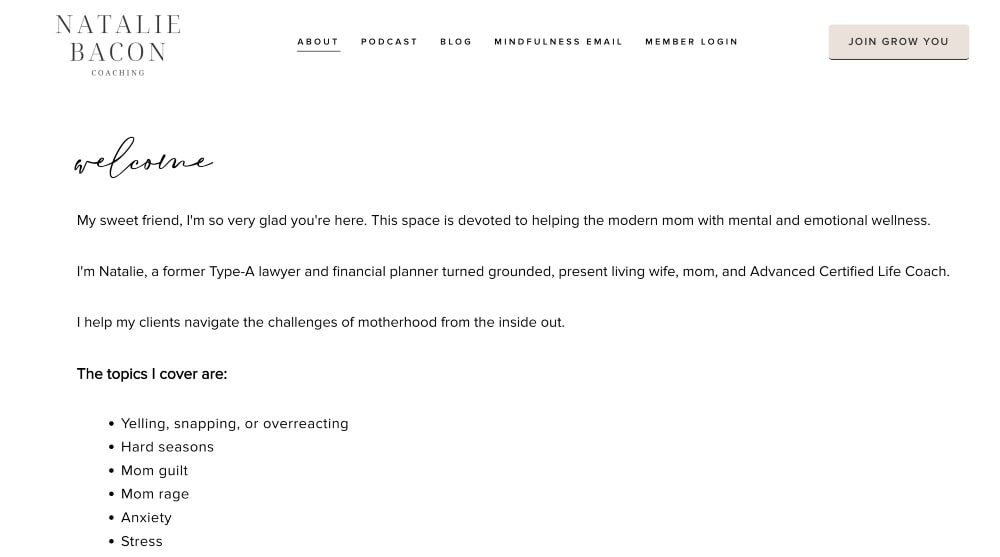
Writing an effective About page, of course, starts with introducing yourself and your background.
But before you start telling your whole life story, it’s important to present a high-level, brief overview of your background, achievements, qualifications, and credentials. This is a great place to include your mission statement and core values if you created any while writing your business plan.
When writing about yourself, you should include details about:
- where you are from,
- what education and experience you have in the relevant field,
- any awards, accomplishments, or achievements that are personally or professionally relevant,
- and any other relevant information that reflects positively on who you are.
Besides sharing the facts, you can also use this as an opportunity to talk about your passions and interests as they relate to your website and audience.
Start getting personal on your page so that your audience can see that there is a real person behind the business.
This is also a great place to add a photo of yourself!
3. Present the Problem
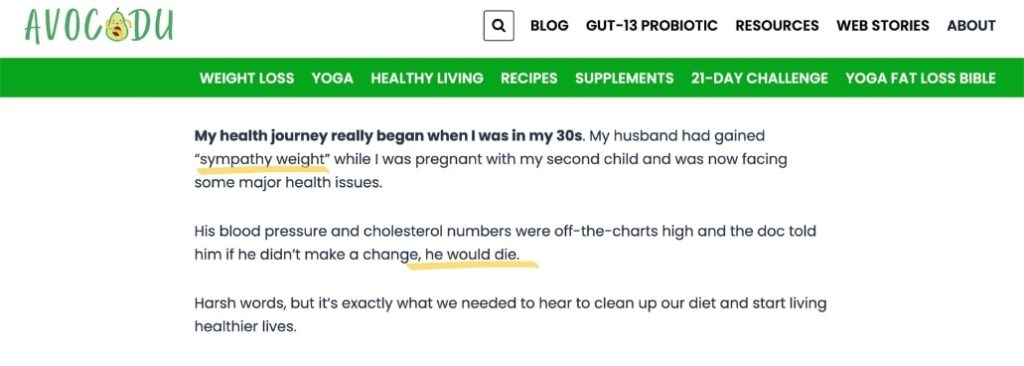
Now that we have set the stage and shared the high-level important stuff to establish your credibility, it’s time to get into the real stuff: the story.
Telling a great story on your About Me pages is a really great way to deepen that connection that we’ve been talking so much about.
Your audience doesn’t want to just see that you know your sh*t. They want to know why you are qualified to help them, and I’m not just talking about the facts and accomplishments.
I’m talking about your life experiences and your personal story as it relates to your career journey.
What overall problem does your website and business solve?
Are you trying to help people lose weight? Take better photos? Cook delicious meals on their own?
Include a section in your About Me page that presents the problem that you are trying to solve and share your own personal experience with this problem in your life. Be vulnerable and remember that this is what will make them feel the most connected to you — knowing that you were in their shoes once.
4. Present the Solution
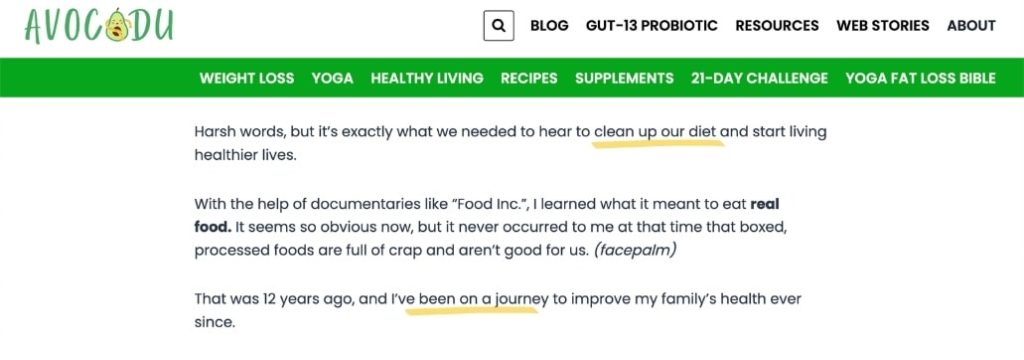
Now, it’s time to present the solution to your audience. How did you solve your problem(s) and get where you are today?
In this section, you’re going to show them why they should listen to you and learn from you — how you can help them. If you sell any products or services on your website, this is a good place to briefly mention them, why you created them, and why they are different.
Don’t get overly salesly here. In fact, you don’t even have to introduce your products just yet, if you don’t want to. There will be another opportunity for that in the last step.
But you can set the stage for your products and services by discussing the steps that led you to overcome your problem and find or develop a solution.
For example, if you’re helping people lose weight, you can talk about:
- what steps you took to finally win your own weight loss battle
- or what steps you took to finally help your clients lose the weight and keep it off
Be specific here when you can. You can also mention specific resources and pages from your website that you can add links to.
5. Include Relevant Testimonials
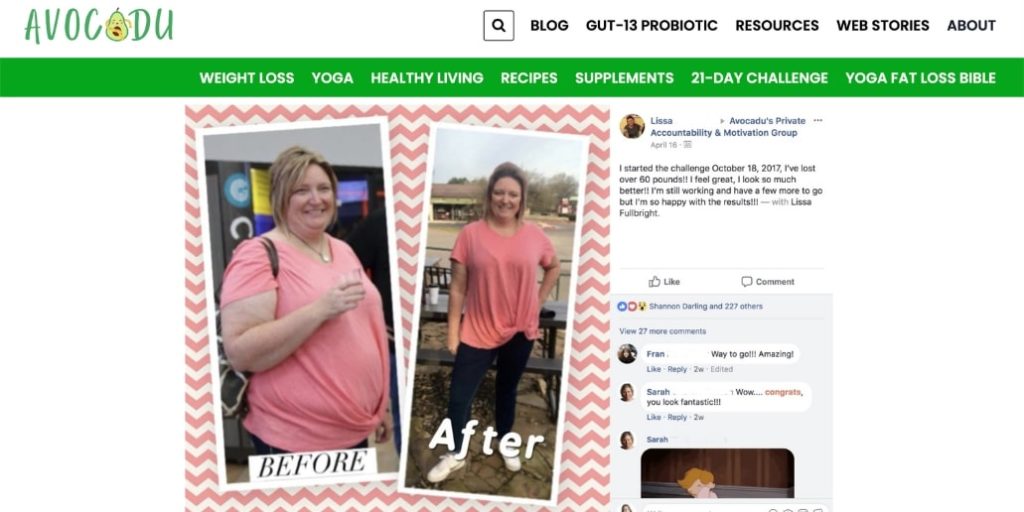
Now that we have presented that solution, it’s time to back it up with some proof!
Adding testimonials from satisfied customers can help demonstrate the quality and value of your product or service from a different perspective and unbiased point of view.
This positive feedback will help build that confidence and trust that we’ve talked about and also further support and provide credence to everything you’ve shared so far.
If you’ve just started a blog and don’t have any testimonials yet, that’s okay! You can always add testimonials at a later date when you get them. If you have ever helped family or friends overcome these same problems, you can also ask them for a quick testimonial to help you get started.
Make sure to add photos or videos when possible as this will have a greater impact than word alone.
6. Add Keywords and Internal Links
Adding keywords and internal links to your About Me page is an important part of optimizing it for search engines as well as providing more information and topics to explore.
Consider doing some quick keyword research with a free tool like Ubersuggest to get some basic keywords to add to your page.
You should also include internal links to other pages on your site so that you can keep users engaged and help them explore deeper into the topics you discuss on your page. You may even combine these at some point and link relevant keywords to other blog posts on your website.
You also can and should link any products that you are selling, but we’ll talk more about that in a moment.
7. Add Photos or Other Visuals
Visuals are essential for a great About Me page because they can help to create an emotional connection with the audience.
Photos and visuals help to bring your story to life and make it more engaging and impactful for your audience.
In the very least, you should include a photo of yourself. If you are telling a story and presenting a problem and solution, you can also include your photos of before and after your transformation.
Words have power, but images and videos magnify that power tenfold.
You can also include infographics, animated GIFs, or any other types of visuals that you think would be helpful.
8. Include a Call-to-Action (CTA)
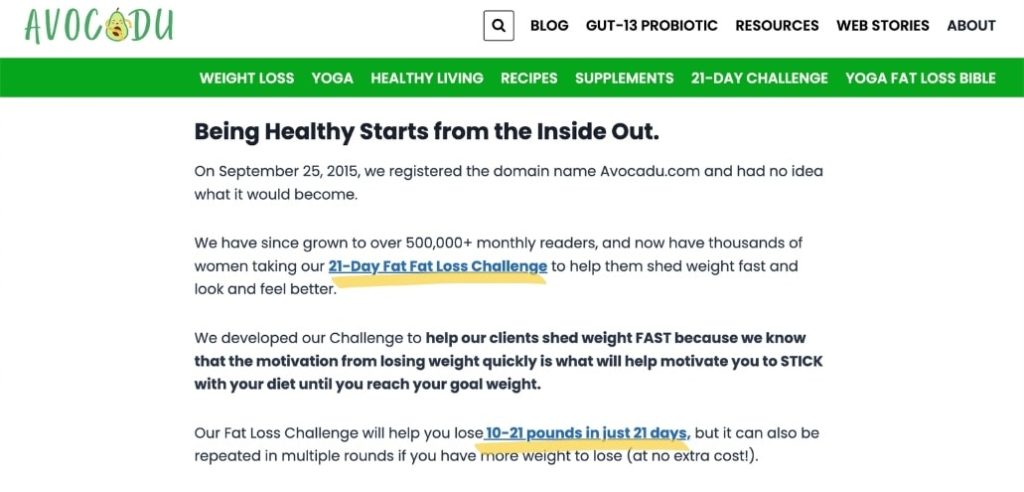
Finally, it’s important to include at least one call-to-action (CTA) in your About Me page. When they are finished reading, what do you want them to do next?
- Read another blog post?
- Sign up for your email list?
- Check out your product or service?
- Follow you on social media?
You can include more than one call-to-action, but the more decisions you present them with, the less impactful each of your call-to-actions will be.
Here is one way that you can include multiple CTAs in your About Me page.
First, you can naturally link other blog posts where relevant topics are discussed throughout the page.
Second, you can link your product or service when you mention finding the solution to your problem.
Lastly, you can include a free email opt-in at the bottom of your About Me page as one final call-to-action for blog visitors or potential clients to learn more.
Of course, it depends on what call-to-action is most important to you right now in your business.
Building an email list has always been a huge priority for us, so that’s what we would recommend, but it could also simply be to subscribe to your YouTube channel or follow you on Instagram or TikTok.
You can also include your contact details on your About page or better, link to a Contact page. Don’t forget to link your About page to your menu so that it can be accessed from your home page.
10 Great About ‘Me’ Examples
Below are a few examples of some great About Me pages that were written using many of the tips outlined in this article!
1. Avocadu
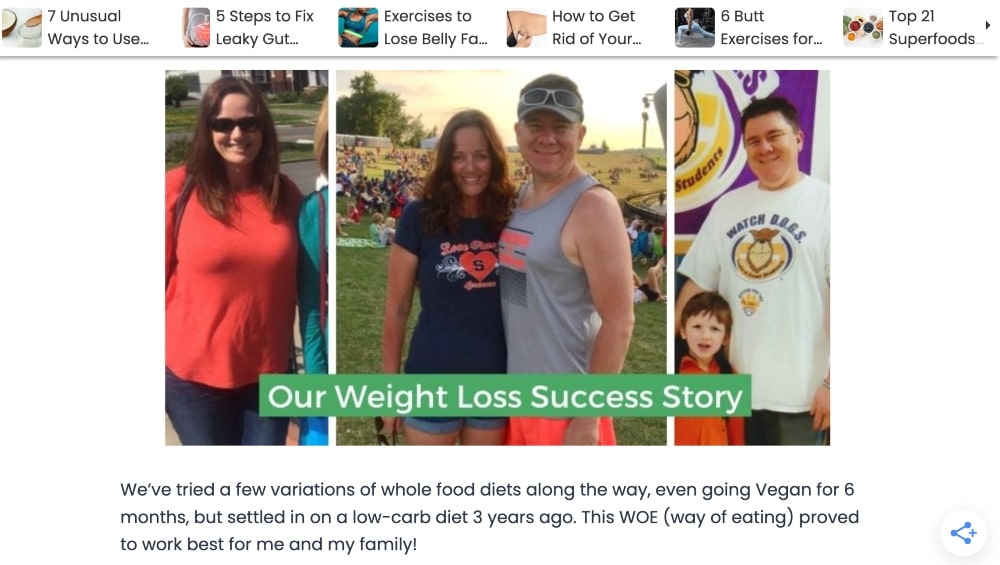
Avocadu’s About Me page is a great example of how to write an About Me page that is impactful and compelling. It features every single one of the cardinal rules that we discussed.
I especially love that Cathy Dean, the owner of the website, included a great photo of not only herself but also of her family. Her target audience is older women with kids and families, so this speaks directly to them.
She also includes several testimonials from her weight loss clients and a call-to-action at the end to check out her weight loss program for potential clients.
2. Natalie Bacon
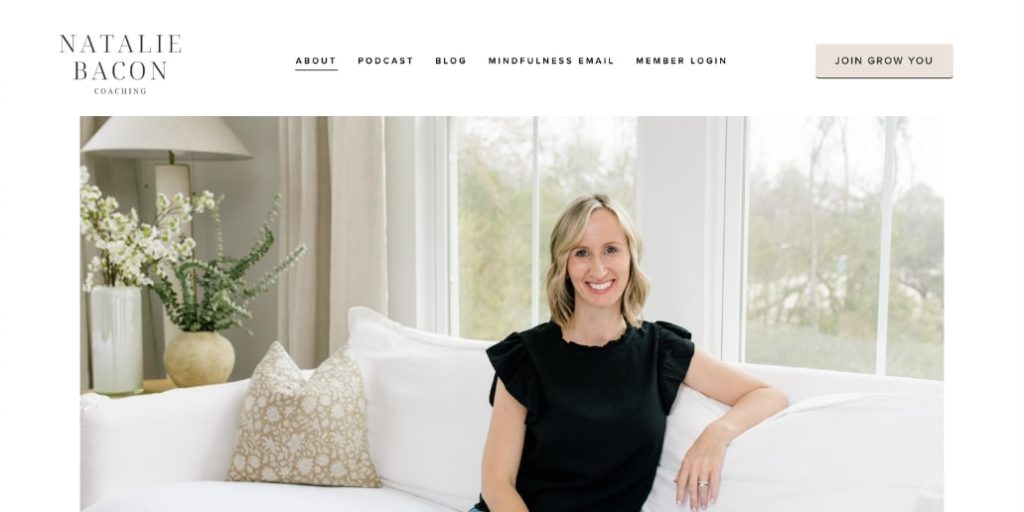
Natalie Bacon’s About page is a good example of a shorter About page that still includes many of the steps that we have written about.
She starts out with an introduction that includes what her website is about, her credentials, and all of the different topics she covers.
She includes a great, professional photo of herself and then goes on to identify her audience directly and address some of the common problems that they face in this particular space.
She ends on a positive note about how she can help with a simple link to her paid product, Grow You.
3. Wifi Tribe
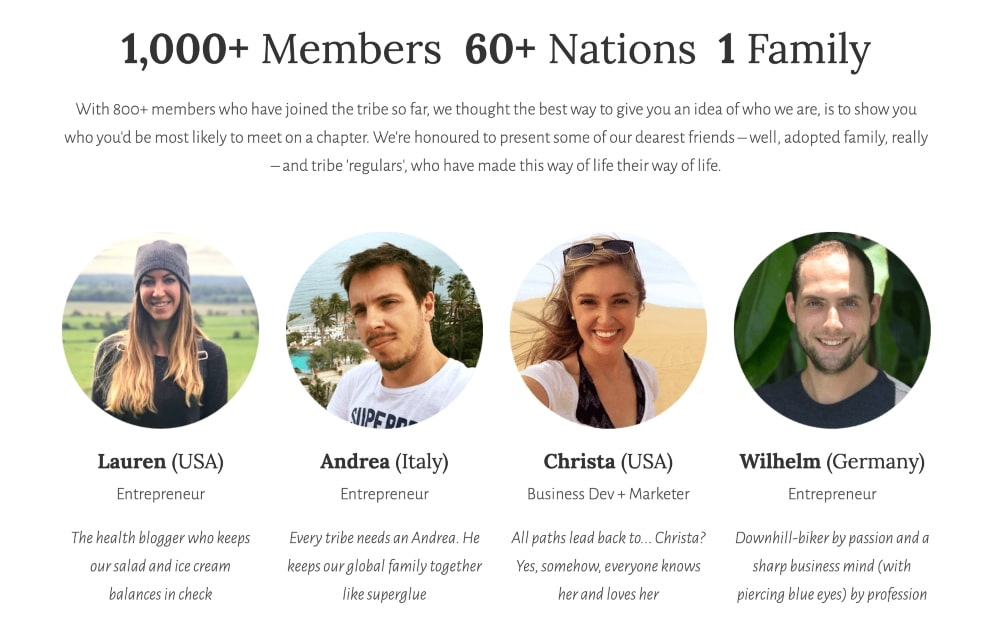
Wifi Tribe is a community of co-living and co-working digital nomads that travels the world together. Their About page is a good example of how you can design a business About page with many of these same principles.
They start out by explaining who they are and what their core values are, which is another great place to include a mission statement, if you have one. They also include an FAQ link here, which is helpful.
Then they directly introduce you to some of the community members, which is a also great place to introduce your team.
They also include links to their podcast to learn more and end with a testimonial video that provides insight from one of their members.
Other Examples
Summary of How to Write an ‘About Me’ Page
Overall, having an ‘About Me’ page is a great way to show potential customers who you are and why they should trust working with you. Sharing a little bit about your personal life in a compelling story is absolutely crucial to building those connections.
Your About page is one of the most important pages on your website to help build relationships with your audience while also helping SEO rankings and potential sales.
Many individuals and businesses use their About Me pages to share their core values, mission statement, and unique selling points to help differentiate them from their competitors.
Examples of great ‘About Me’ pages can be found all over the web – some incorporate stunning visuals alongside short snippets about the individual or business, others may provide detailed written accounts of their life’s journey so far, while some may go into greater detail about the products or services they offer.
No matter which approach you choose for your own site, remember to bring out your personality and make it easy for website visitors and potential clients to learn more about who they are dealing with.